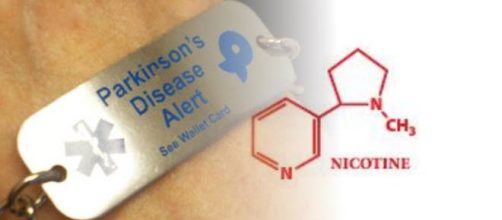A million people in the USA suffer from Parkinson’s disease and it’s becoming more common as the population ages – it’s much more common in the elderly, and usually starts to appear around age 60. After Alzheimer’s it’s the most common neurodegenerative disease, and it causes huge distress both for the sufferer and their loved ones. Parkinson’s is incurable and expensive to care for, but now there are hopes of a new treatment from a controversial source – nicotine.
Smoking increases the risk of a whole slew of diseases but doctors have known for over 50 years that Parkinson’s bucks the trend – smokers are much less likely to develop it, and if they do the disease progresses more slowly and mortality rates are lower.
Nobody was quite sure why, although nicotine was suspected. Meanwhile doctors certainly weren’t going to recommend smoking – cigarettes kill half of regular users, while Parkinson’s affects less than 5% of 80-year-olds.
Recently the evidence in favor of nicotine being what protects smokers has strengthened. In 2013 scientists found that people who ate potatoes, peppers and tomatoes every day had a lower rate of Parkinson’s than those who didn’t. All those vegetables, like tobacco, are in the nightshade family – and they contain nicotine. Peppers contain the highest level (although not as high as tobacco) and it turns out they protect against Parkinson’s almost as well as smoking does.
A few years earlier a team at Vanderbilt University found that nicotine patches – the kind smokers try to quit with – helped slow age-related mental decline in elderly patients.
This is a simpler condition than Parkinson’s, but it does have similarities. Putting this together with the vegetable research, many scientists are increasingly convinced that it is nicotine that protects against Parkinson’s.
Nicotine has had a bad press for a long time, but that’s mainly because it’s so closely associated with smoking. On its own, though, most scientists agree that it’s a very safe drug. There’s no evidence that it causes cancer or heart disease, and if you separate it from the other chemicals in tobacco smoke it doesn’t even seem to be very addictive. Smoking is highly addictive, but pure nicotine probably isn’t; in the Vanderbilt study none of the patients became addicted despite wearing high-strength patches every day for six months.
It seems to be a combination of nicotine and monoamine oxidase inhibitors – chemicals found in smoke – that makes cigarettes so easy to get hooked on.
Now researchers in the USA and Germany are running a large experiment to see if nicotine can slow the progress of Parkinson’s once it’s appeared. A hundred and sixty patients are involved, half wearing nicotine patches and half placebos. Team leader Doctor James Boyd expects that, at the end of the study, those with the real nicotine patches will have less severe symptoms than those with the placebo.
Scientists might even be closing in on the reason why nicotine seems to protect against the disease. Parkinson’s kills dopamine-producing cells in the brain, and it’s the loss of those cells that causes the most distressing symptoms.
Dopamine helps send signals along our nerves, and if we don’t make enough of it our brains and nervous systems work less efficiently. Nicotine is a stimulant, and one of the ways it achieves its effects is to strengthen the cells that make dopamine. Some researchers think it strengthens them enough that they can resist the effects of the disease.
As well as Boyd’s team, four more groups are running similar experiments. It will be a couple of years before all the data is collected, but if the results are what Boyd expects we could soon have a safe treatment that helps Parkinson’s sufferers – and nicotine might have a better reputation than it has now.

